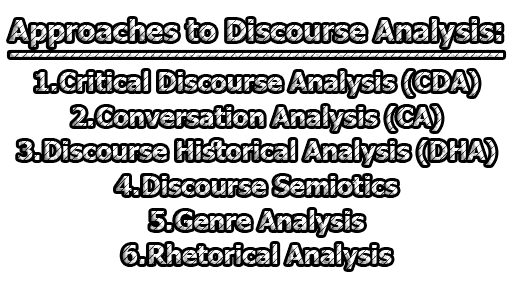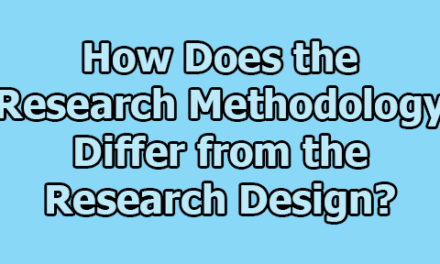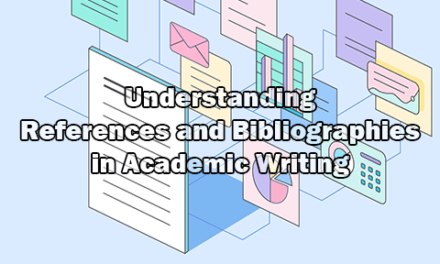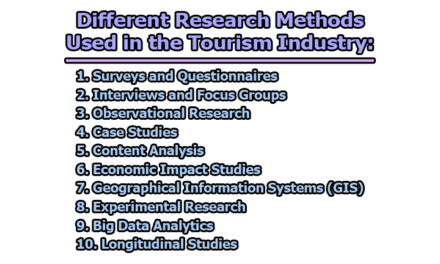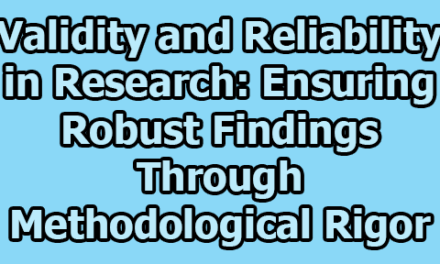Discourse analysis is a branch of linguistics and sociolinguistics that focuses on the study of language use in context. It examines how language is used to construct meaning, express opinions, and shape social relationships and power dynamics within a given society. The goal of discourse analysis is to understand the relationships between language, culture, and society, as well as how language is used to achieve particular social and political effects. In the rest of this article, we are going to know about the approaches to discourse analysis, how to do discourse analysis, the strengths, and weaknesses of discourse analysis, when to use discourse analysis, and when not to use discourse analysis.
Approaches to Discourse Analysis:
There are several approaches to discourse analysis, including:
- Critical Discourse Analysis (CDA): This approach focuses on the ways in which language is used to maintain or challenge social inequality and power relations. CDA examines the language used in political discourse, media discourse, and other forms of communication to uncover the underlying ideologies and power structures that shape and are shaped by language use.
- Conversation Analysis (CA): This approach focuses on the study of talk in interaction. It examines the ways in which participants use language to accomplish specific communicative goals, such as seeking information, making requests, or giving advice. CA is often used to study everyday conversations, and it provides insights into the ways in which language is used to create and maintain social relationships.
- Discourse Historical Analysis (DHA): This approach focuses on the study of language use over time. It examines how language and discourse practices have changed over time, and how they reflect broader social and cultural shifts.
- Discourse Semiotics: This approach focuses on the study of language as a system of signs. It examines how words, phrases, and other linguistic elements work together to create meaning and how they are used to shape our understanding of the world.
- Genre Analysis: This approach focuses on the study of different text types, such as news articles, academic papers, and advertisements. It examines how these texts are structured, what linguistic and stylistic features they have in common, and how they reflect and shape social norms and expectations.
- Rhetorical Analysis: This approach focuses on the study of the persuasive strategies used in language. It examines how speakers and writers use language to influence their audience, and how they use different techniques, such as metaphor, irony, and hyperbole, to achieve their goals.
How to Do Discourse Analysis?
Discourse analysis is a method for studying written, spoken, or signed language use in a particular context. It aims to uncover the patterns, structures, and meaning-making practices in discourse, whether it’s a conversation, an interview, a media broadcast, a political speech, or a literary text. To perform discourse analysis, you can follow these steps:
i. Identify the discourse: Choose a text, conversation, or speech that you want to analyze and determine the discourse community or setting it belongs to. Consider the purpose, genre, audience, and context of the discourse.
ii. Collect and transcribe data: Transcribe the discourse as accurately as possible, preserving the original language, intonation, and speech acts. If the discourse is in video or audio format, consider making a verbatim transcription.
iii. Code the data: Read through the transcript and identify meaningful units or segments of discourse. You can code based on topics, themes, relationships, speech acts, power dynamics, or any other aspect that you want to explore.
iv. Analyze the coded data: Use the codes to analyze the discourse, looking for patterns, themes, relationships, and meaning-making practices. Consider the context, culture, and ideology that shape the discourse, and how the discourse participates in constructing and reinforcing social norms, beliefs, and values.
v. Draw conclusions: Summarize your findings and draw conclusions about the discourse, considering how it reflects and influences social reality.
Strengths of Discourse Analysis:
There are several strengths of discourse analysis, including:
a. Insight into language use in context: Discourse analysis provides a more complete understanding of language use by examining it in the context in which it is produced and consumed. This can lead to a better understanding of the relationships between language, culture, and society.
b. Uncovering hidden ideologies and power dynamics: Discourse analysis can reveal the underlying ideologies and power dynamics that shape language use. For example, a critical discourse analysis of political discourse can uncover the ways in which politicians use language to maintain or challenge existing power structures.
c. Improved communication: By understanding how language is used to achieve specific communicative goals, discourse analysis can help individuals to become more effective communicators. For example, by studying the strategies used in successful persuasive speeches, individuals can improve their own public speaking skills.
d. A better understanding of social and cultural change: Discourse analysis provides a means of studying the ways in which language and discourse practices have changed over time, and how they reflect broader social and cultural shifts. This can provide insights into the ways in which society and culture are evolving, and how language use is adapting to these changes.
e. Interdisciplinary approach: Discourse analysis is an interdisciplinary field that draws on insights from linguistics, sociology, anthropology, and other disciplines. This allows for a more comprehensive understanding of the relationships between language, culture, and society.
Weaknesses of Discourse Analysis:
Like any approach, discourse analysis also has its limitations, including:
a. Complexity: Discourse analysis can be a complex and challenging field to study, requiring a high level of linguistic and analytical skills. This can make it difficult for those without a background in linguistics or a related field to fully understand and engage with the approach.
b. Subjectivity: Discourse analysis can be subjective, as the interpretation of a text or conversation depends on the perspective of the analyst. This can lead to differing interpretations of the same text, and it is important to be aware of one’s own biases and assumptions when conducting discourse analysis.
c. Limited generalizability: The findings of discourse analysis are often specific to the particular context in which the language use being studied occurs. This can limit the generalizability of the findings, and it can be difficult to apply insights from one context to another.
d. Time-consuming: Conducting a thorough discourse analysis can be time-consuming, as it requires a close examination of language use in context and often involves the analysis of large amounts of data.
e. Ethical considerations: Discourse analysis can raise ethical considerations, particularly when examining sensitive or confidential topics. Analysts must be aware of these issues and take appropriate steps to ensure that their research does not harm participants or violate their rights.
When to Use Discourse Analysis:
Discourse analysis can be used in a variety of contexts and for a variety of purposes, including:
- Studying language use in specific domains: Discourse analysis can be used to study language use in specific domains, such as politics, media, education, or health. This can provide insights into the ways in which language is used to shape our understanding of these domains and the relationships between them.
- Examining power dynamics and social inequality: Discourse analysis can be used to examine the ways in which language is used to maintain or challenge social inequality and power dynamics. For example, a critical discourse analysis of political discourse can reveal the ways in which politicians use language to maintain their power and influence over society.
- Improving communication skills: Discourse analysis can be used to improve communication skills by studying the ways in which language is used to achieve specific communicative goals. For example, a discourse analysis of successful persuasive speeches can provide insights into the strategies used to influence an audience.
- Examining social and cultural change: Discourse analysis can be used to examine the ways in which language and discourse practices have changed over time, and how they reflect broader social and cultural shifts. This can provide insights into the ways in which society and culture are evolving, and how language use is adapting to these changes.
- Interdisciplinary research: Discourse analysis can be used as a tool in interdisciplinary research, drawing on insights from linguistics, sociology, anthropology, and other fields to provide a more comprehensive understanding of the relationships between language, culture, and society.
When not to Use Discourse Analysis:
Discourse analysis is a valuable approach for understanding language use in context, but it is not appropriate for every research question or situation. Some examples of when not to use discourse analysis include:
- When the focus is on individual words or sentences: Discourse analysis focuses on language use in context, and is not well-suited to the study of individual words or sentences in isolation. If the focus of the research is on the meaning of individual words or sentences, other approaches such as lexical analysis or syntax analysis may be more appropriate.
- When a large sample is needed: Discourse analysis can be time-consuming and resource-intensive, as it requires a close examination of language use in context. If a large sample is needed to answer the research question, other approaches such as survey research or experimentation may be more appropriate.
- When the focus is on universal linguistic features: Discourse analysis is concerned with language use in context, and may not be appropriate for the study of universal linguistic features that are not influenced by context. For example, if the research question is focused on the grammar of a language, a linguistic approach that focuses on the language system itself may be more appropriate.
- When the research question is not well-suited to a discourse-level analysis: Discourse analysis is a powerful approach for understanding the relationships between language, culture, and society, but it may not be well-suited to research questions that are not concerned with these relationships. For example, if the research question is focused on the physiological effects of stress on the body, a biological approach may be more appropriate.
At the end of the day, we can say that discourse analysis is a valuable approach to understanding the role of language in shaping our understanding of the world. By examining language use in context, discourse analysis provides insights into the relationships between language, culture, and society, and can be used to study a wide range of topics and issues, including power dynamics, social inequality, and communication practices. Discourse analysis has its strengths and weaknesses, and it is important to be aware of these when conducting research. When choosing an approach for research, it is important to carefully consider the research question and the goals of the study, and choose an approach that will allow for the best possible answers. Discourse analysis may not be the best approach for every research question, but when used appropriately, it can provide valuable insights into the relationships between language, culture, and society.

Library Lecturer at Nurul Amin Degree College

